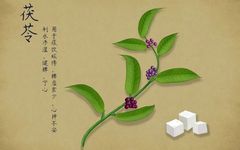In the realm of Qi and Huang, rediscovering the beauty of Traditional Chinese Medicine.
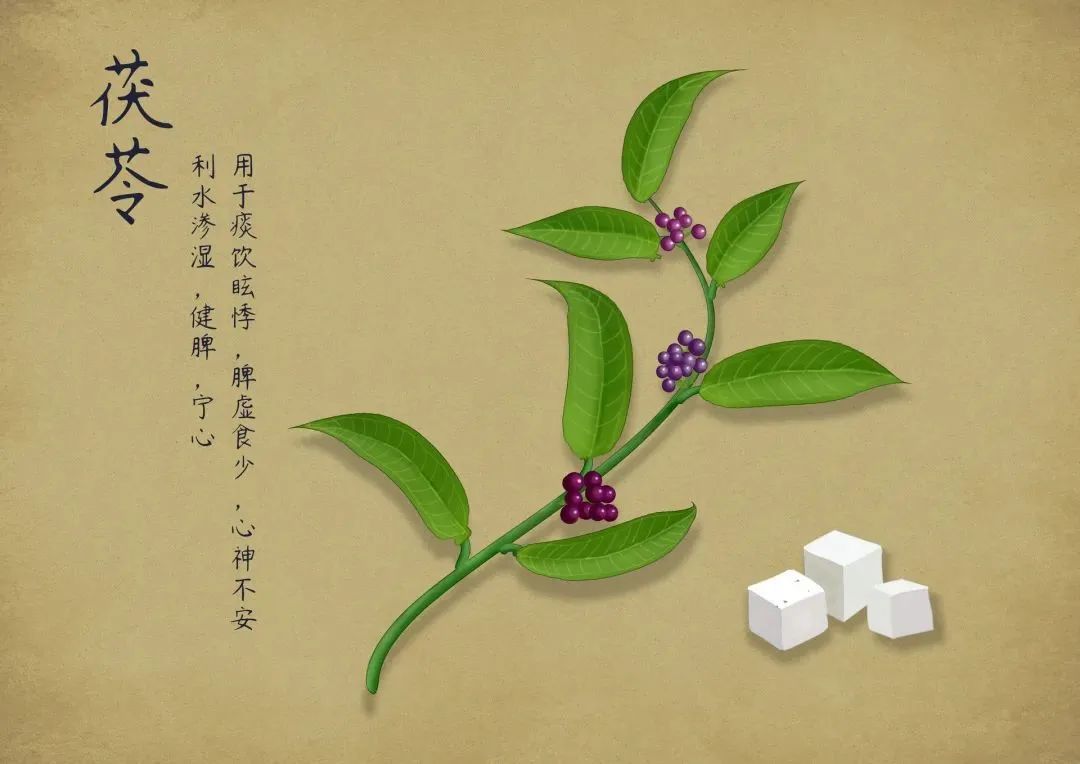
1. The History of Poria
In the Jin Dynasty, the famous pharmacologist Ge Hong recorded a legend in his work “Baopuzi”: There was a man named Ren Ziji who continuously consumed Poria (Fu Ling) for 18 years, and the celestial maiden came to meet him, granting him the ability to become invisible and not consume earthly grains. This mythological story illustrates that Poria was a highly regarded health ingredient in ancient times.
In the poem “Sending A Gui Back to Hua” by Li Shangyin from the Tang Dynasty, it states: “Because of you, I sought medicine in Huayang, under the green pine roots, there is much Poria.” Poria is a well-known medicinal food in TCM, historically praised as a “divine medicine for all seasons” due to its extensive efficacy, regardless of the season; when combined with various herbs, it can exert its unique effects on ailments of cold, heat, wind, and dampness.
As early as in the “Huainanzi” written by Liu An, the Prince of Huainan during the Western Han Dynasty, there is a record stating: “A thousand-year-old pine, with Poria below and Cuscuta above.”
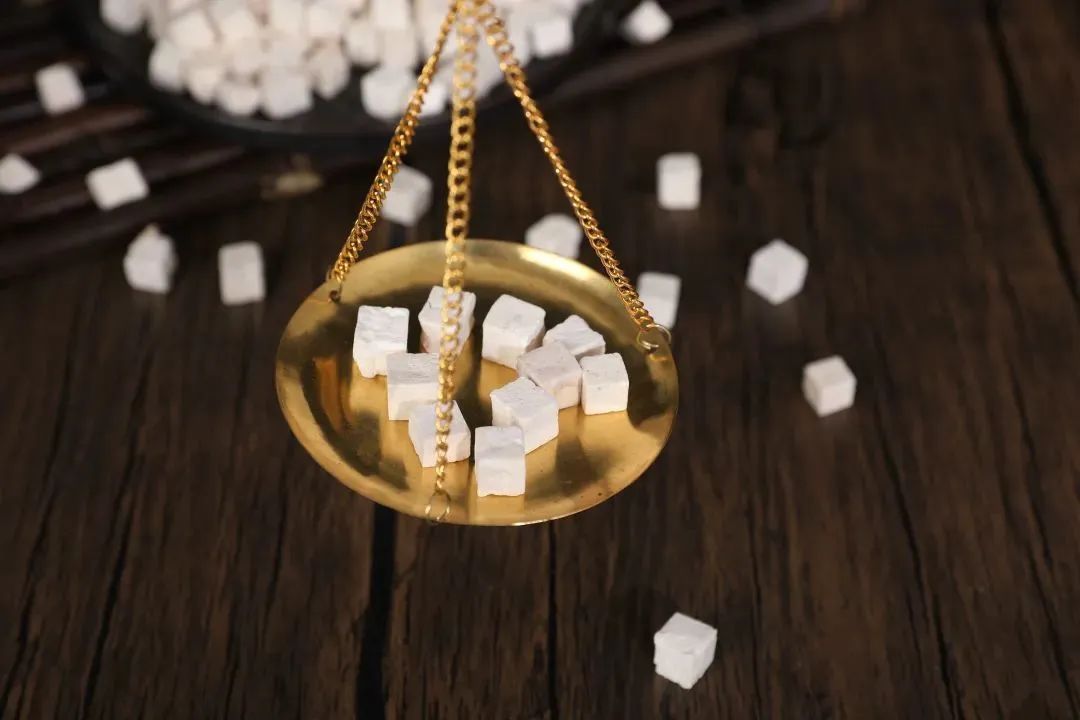
Poria has not only been valued by physicians throughout history, but also has a deep connection with many renowned literati.
It is said that Su Zhe, one of the Eight Great Prose Masters of the Tang and Song Dynasties, was frail and sickly in his youth. In summer, due to spleen and stomach weakness, he had poor digestion and appetite; in winter, he frequently caught colds and coughed due to lung and kidney qi deficiency. After consulting many doctors and taking numerous medicines without success, it was not until he reached the age of thirty that he learned the way of health preservation, practiced guiding qi, and regularly consumed Poria, that after a year, his long-standing ailments disappeared without a trace.
From then on, he devoted himself to the study of medicinal health and wrote the “Fu Ling Fu” (Ode to Poria), in which he stated: (Consuming Poria) can solidify form and nourish qi, prolong life and prevent aging. It can calm the soul and stabilize the mind, making one’s complexion like that of a maiden, with spirit and qi at peace.
Perhaps due to the high market demand for Poria, there were already counterfeit products in ancient times. The Tang Dynasty writer Liu Zongyuan recorded in his “Liu Hedong Collection” that once he fell ill with abdominal distension and palpitations. A doctor advised him to consume Poria. He bought Poria to cook, but his condition worsened. Later, upon consulting another doctor, he was told: “You bought taro, not Poria.” He then wrote the “Identification of Fu Ling” (with preface) to warn the public.
During the Ming and Qing Dynasties, Luotian Poria became a tribute, used for health preservation in the imperial court.
In the classic novel “Dream of the Red Chamber”, Poria is mentioned multiple times.
In Chapter 60, when officials from Guangzhou visit the Jia family, they present Poria cream as a gift, saying it is exquisite and snow-white, mixed with human milk, and eating a bowl every morning is very nourishing.
In Chapter 28, when Wang Xifeng mentions the name of a pill prescribed by the doctor, Baoyu lists a bunch of names, including “Poria from the root of a thousand-year-old pine.”
Additionally, Poria is included in the ginseng nourishing pill that Daiyu eats, and in the qi-nourishing soup for the spleen and liver that Qin Keqing consumes.
Poria, as a medicinal herb, originates from the “Shennong Bencao Jing” (Shennong’s Classic of Materia Medica), and this medicine comes from the dried sclerotium of the fungus Poria cocos. Wild Poria is generally harvested from July to March of the following year in pine forests. Cultivated Poria is usually harvested in the second or third year after inoculation, with the best quality harvested after the beginning of autumn; harvesting too early affects quality and yield.——Excerpted from “Chinese Poetry, Idioms, and TCM Health Wisdom”
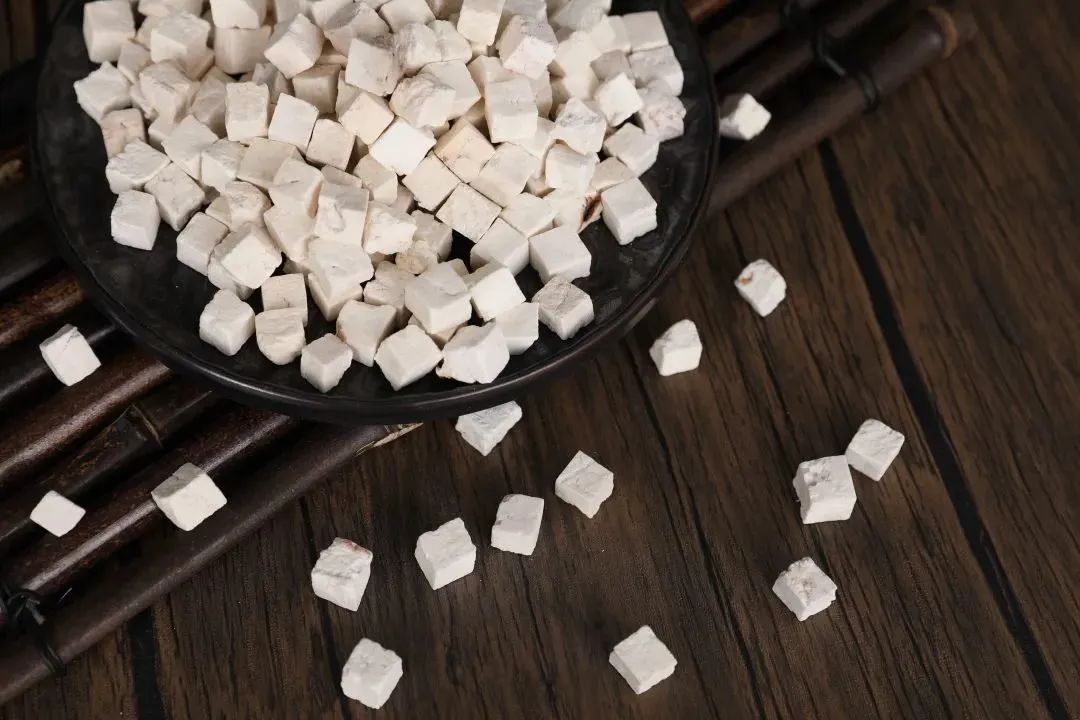
Poria has many aliases, often imbued with meanings of immortality, such as Yu Ling, Fu Ling, Wan Ling Gui, Fu Tu, and Bu Si Mian.
In the Ming Dynasty, Li Shizhen explained in the “Bencao Gangmu”: “Poria, referred to as Fu Ling in the ‘Records of the Grand Historian’, is the spirit of the pine, which is condensed and formed, hence it is called Fu Ling or Fu Shen.”
The “Xianjing” states: “Fu Ling, as large as a fist, when worn, can eliminate all evil spirits, thus the spirit of the pine can also be summoned. The common name ‘Ling’ is passed down with Fu Ling below and Cuscuta above, hence it is also called Fu Tu. Some say ‘its shape resembles a rabbit, hence the name’, which is also valid.”
Moreover, those that embrace the pine root are said to have “the essence of the pine root that has not been exhausted, and its essence is abundant. When the essence is strong, it is released outward, forming Poria; hence it does not embrace the root, separating from its original body, which signifies separation. If the essence is not abundant, it can only attach to the original root, thus it does not separate from the original, hence it is called Fu Shen.”
Poria is a fungal plant that parasitizes on pine roots, generally with a black-brown outer skin and white or pink interior. Therefore, it can be found in many places suitable for pine growth, such as Yunnan, Anhui, Hubei, Henan, and Sichuan. However, the best production area for Poria remains in the Dabie Mountain region of Hubei, where both light and water resources are abundant, and the yield is the highest.
2. How to Distinguish Genuine Poria from Fake
First, observe: After peeling, the cut Poria generally presents three colors: white, light red, or light brown. Also, check the cut surface; genuine Poria has a uniform color and a delicate cut surface, while inferior Poria has uneven color and a rough cut surface.
Second, smell: Poria has little to no smell; avoid buying if it has a musty, sour, or even sulfuric odor.
Third, taste: Good Poria has a very mild taste, with a slight sweetness upon careful tasting, while inferior Poria may have astringent, bitter, or sour tastes.
Fourth, use iodine: If iodine is dropped on it and there is no color change, it indicates it is genuine; if it turns blue, it indicates it is a substandard product mixed with starch.
Fifth, find reliable merchants or acquaintances to ensure you purchase genuine Poria or wild Poria.

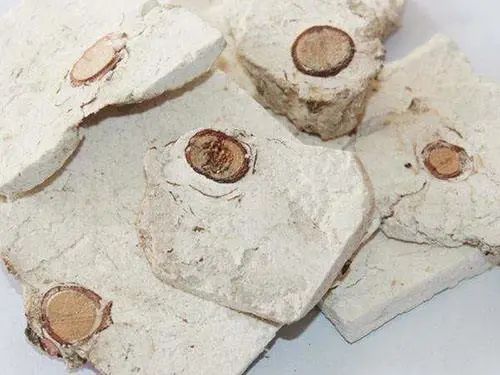
3. The Difference Between Poria and Fu Shen
Poria that is still attached to the pine root is called Fu Shen, which can also be referred to as Fu Shen Mu. Those without the pine root are Poria. Fu Shen is a part of Poria, but their effects are slightly different; Poria is more focused on promoting urination and draining dampness, while Fu Shen is more focused on calming the mind and stabilizing the spirit.
4. The Efficacy of Poria
According to the “Shennong Bencao Jing”: Poria, also known as Fu Tu, has a sweet taste, is neutral, and non-toxic. It treats chest and flank counterflow, anxiety, fright, palpitations, pain below the heart, cold and heat, fullness, cough, and counterflow. It stops dry mouth, dry tongue, and promotes urination. Long-term use calms the soul, nourishes the spirit, prevents hunger, and prolongs life. It grows under large pines in valleys.
1. Calms the heart and spirit, fights toxins and cancer. Its properties are mild, draining dampness without harming the righteous qi. Consuming it in moderation can be a great tonic during the humid seasons of spring and summer.
2. It can treat symptoms such as difficulty urinating, edema, phlegm cough, nausea, vomiting, diarrhea, nocturnal emissions, turbid urination, anxiety, and forgetfulness.
3. The contained Poria acid has effects of enhancing immunity, anti-tumor, as well as sedative and blood sugar-lowering properties.
4. It can relax the smooth muscles of the digestive tract, inhibit gastric acid secretion, prevent liver cell necrosis, and has antibacterial effects.
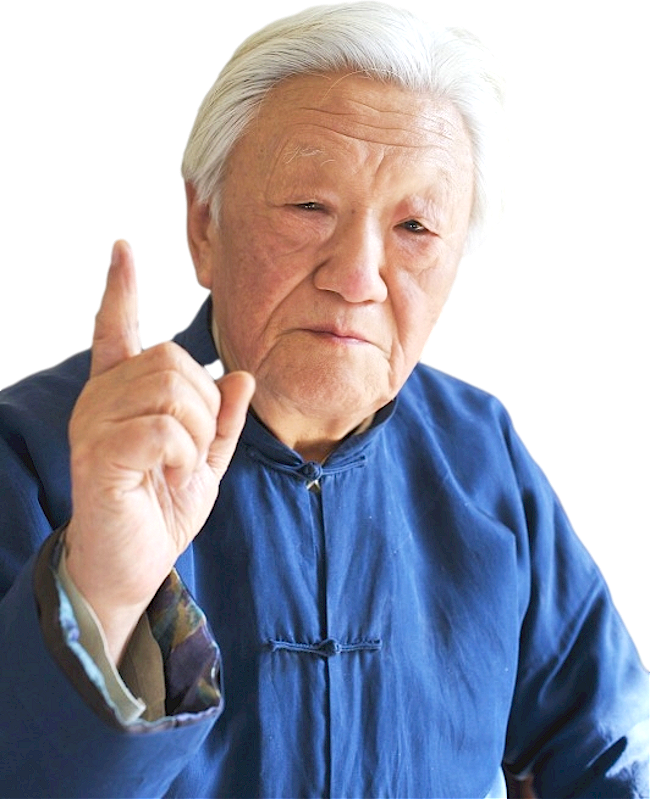
5. Introduction of Poria by Guo Lao
Summary:
1. “The lung is the source of water transformation”; issues in the lungs are particularly effective for promoting urination. Poria is the best herb for promoting urination in the lungs. If Poria is removed from Er Chen Tang, it should have a hundred percent effect, but it has none. The heat in the lungs is particularly good for unblocking the intestines; the first herb for unblocking the intestines in the lungs is Gua Lou (Trichosanthes fruit).
2. Poria benefits the water in all body tissues; the function of Bai Zhu (Atractylodes) can be described in our language as absorbing the moisture from tissues into circulation. Therefore, Poria and Bai Zhu are diuretic herbs with universal significance.
3. Poria is for unblocking yang and promoting water; what does unblocking yang mean? I will explain this unblocking yang: it means that the function of unblocking blood vessels and all functions of diuresis are unobstructed, allowing all diuretic functions to be cleared; it drains water from all body tissues, from the water in the blood, and from the water entering the blood; Ze Xie (Alisma) drains kidney water, which is the accumulated water in the kidneys that cannot be expelled. Zhu Ling (Polyporus) is a formula for treating heat; if there is heat, there is a rejection reaction, leading to difficulty urinating, Zhu Ling is used.
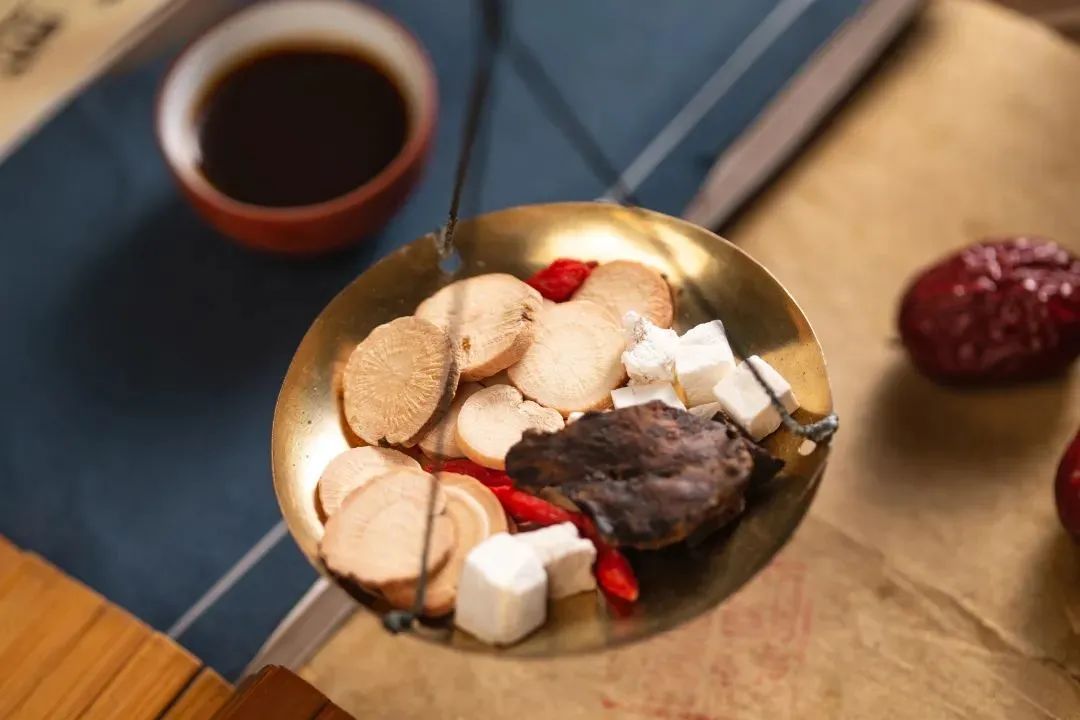
6. Daily Consumption of Poria
As a medicinal food, Poria has always been a common ingredient in various health-preserving recipes. In the Qing Dynasty, imperial physicians even regarded Poria as the first choice for tonics. Emperor Qianlong consumed Ba Zhen Gao (Eight Treasures Cake) for 40 years and lived to 88 years, while Empress Dowager Cixi particularly enjoyed Poria dishes, often ordering the imperial kitchen to serve Poria cakes, Eight Treasures cakes, and more.
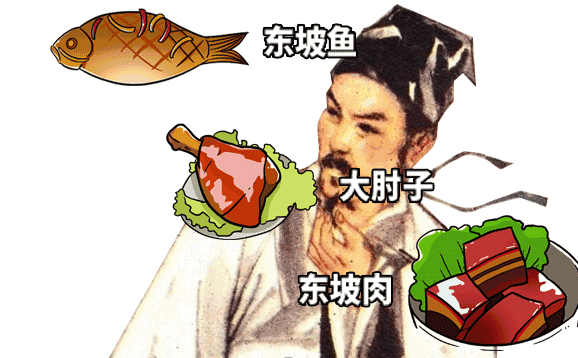
Su Dongpo also recorded the method of making Poria cakes in “Dongpo Miscellany”: “Use nine steams of sesame, add peeled Poria and a little white honey to make cakes. Over time, strength will not decline, and all diseases will naturally disappear; this is the secret to longevity.”
In addition to being made into cakes and pastries, Poria can also be used to brew water as a tea, and when cooking porridge, making soup, or brewing wine, combining Poria with other ingredients is also very beneficial for health. However, it is important to avoid spicy foods when consuming Poria, as spicy and heavily flavored foods can affect its efficacy; also, avoid overly raw, cold, or greasy foods, as these can increase phlegm and dampness accumulation in the body, prolonging the time for Poria to exert its effects.
Although Poria has certain health benefits, it should not be consumed blindly. It is best to follow medical advice, purchase from reputable sources, and consume in reasonable amounts and combinations to truly realize its intended effects.
 7. Poems Mentioning PoriaPoetic lines starting with “Poria” “Dan sha shou jian xu, Fu Ling zha ren xing.” — From the Southern Song Dynasty, Lu You’s “Ganhua” Poetic lines ending with “Poria” 1. “In the past, the elder’s hair turned white, under the thousand-year-old pine, I dug Poria.” — From the Tang Dynasty, Xu Ning’s “Jian Bai Zhang Ren” 2. “Knowing that the pine root grows Poria, in late life, I wish to cook together.” — From the Tang Dynasty, Du Fu’s “Yan Shi Xi Fang Ge Xing” 3. “Sending words to friends in the mountains, because of you, I send Poria.” — From the Southern Song Dynasty, Lu You’s “Dao Shi Ye Yi”4. “Sweeping away the clouds and snow with the red dawn, digging stones and moving pines to obtain Poria.” — From the Tang Dynasty, Guan Xiu’s “Mountain Dwelling Poems, Twenty-Four” 5. “The stone sail looks back, not far away, I must gather Poria in the clear autumn.” — From the Southern Song Dynasty, Lu You’s “Baoshi” 6. “Sending words to Yang Yuanwai, the mountain is cold and there is little Poria.” — From the Tang Dynasty, Du Fu’s “Meeting Yang Shaofu in Xiangyang” 7. “I will take a small path and compare it to a thousand feet, knowing that there is a miraculous effect like Poria.” — From the Song Dynasty, Su Shi’s “Thanking Wang Zezhou for Sending Long Pine and Briefly Mentioning Zhang Tianjue” 8. “You are sweeping snow and collecting pine seeds, I have already opened hazelnuts to obtain Poria.” — From the Song Dynasty, Su Shi’s “I Have a Little Knowledge of Planting Pine” 9. “A new golden beak is forged, and I will dig Poria in famous mountains.” — From the Southern Song Dynasty, Lu You’s “Traveling and Returning to Sleep, Obtaining Miscellaneous Poems” 10. “A tree will be compared to the one in my bag, how many years will there be Poria?” — From the Tang Dynasty, Liu Shang’s “Responding to Dao Fen’s Painting of Pine” 11. “Listening quietly to the stream grinding cloud mother, carefully digging the pine root to collect Poria.” — From the Southern Song Dynasty, Lu You’s “Mao Ting” 12. “Mixing stones to guess good jade, seeking seedlings to obtain Poria.” — From the Tang Dynasty, Xue Neng’s “Hua Yue”13. “After the golden gate, the talented people visit each other, and I will send Poria to the world.” — From the Tang Dynasty, Zhang Hu’s “Responding to Liu Zongyan’s Gift” 14. “Morning and evening, I will follow you, the pine root has Poria.” — From the Northern Song Dynasty, Huang Tingjian’s “Jokingly Responding to Yu Qing Lao Dao Ren’s Three Poems on a Cold Night” 15. “The general lets his hair down, and the short sword digs Poria.” — From the Southern Song Dynasty, Lu You’s “Zhao General” 16. “Even if I have not obtained Poria, I will still pick up the flowing fat.” — From the Song Dynasty, Su Shi’s “Jokingly Planting Pine” 17. “Please buy the golden crow’s beak for me, and return to the autumn mountain to dig Poria.” — From the Southern Song Dynasty, Lu You’s “Writing Thoughts in a Quatrain” 18. “The nine autumn frost falls, and the flowing fat becomes Poria.” — From the Tang Dynasty, Li Yi’s “After Resigning, Entering Huashan to Collect Poria and Meeting a Taoist” 19. “In the smoke and waves, I collect water plants, and in the autumn mountains, I dig Poria.” — From the Southern Song Dynasty, Lu You’s “Sick Miscellaneous Topics” 20. “When will I present the ‘Ode to Xiangru’, together we will collect Poria on Songshan.” — From the Tang Dynasty, Zhang Qiao’s “Sending Friends” 21. “A hundred-foot pine root produces Poria, a thousand years of nurturing resembles a human form.” — From the Southern Song Dynasty, Lu You’s “Zong Bi” 22. “By the pond in autumn, I dig sweet chrysanthemums, and in spring, I collect Poria on the mountain.” — From the Southern Song Dynasty, Lu You’s “Traveling and Studying, Shooting Observations”23. “For twenty years, I have consumed Poria, and half of my letters are the ‘Classic of the Old Man'” — From the Tang Dynasty, Jia Dao’s “To the Cow Mountain Man” 24. “The pine root nurtures Poria, and at the end of the year, I look forward to the royal carriage.” — From the Northern Song Dynasty, Huang Tingjian’s “Responding to Shen Lao’s Gift” Poetic lines with “Poria” in the middle 1. “It is said that in the past, a monk planted it, and below it should be the spirit of Poria.” — From the Tang Dynasty, Cao Song’s “Title of Monk Pine Zen”2. “If only Poria could become amber, it would not be for the pine to age and transform into dragon scales.” — From the Tang Dynasty, Li Shen’s “New Building Poems, Twenty Poems on Qiqi Trees” 3. “Because of you, I sought medicine in Huayang, under the green pine roots, there is much Poria.” — From the Tang Dynasty, Li Shangyin’s “Sending A Gui Back to Hua” 4. “The branches should be recognized by the black crane, the roots are deep and grow with Poria.” — From the Tang Dynasty, Xu Yin’s “Painting Pine” 5. “Let the green pine be planted for ten miles, and in the future, I will still see Poria grow.” — From the Southern Song Dynasty, Wen Tianxiang’s “Birthday in the Mountains” 6. “Pouring the bottle, the cloud mother is slippery, rinsing the teeth with the fragrance of Poria.” — From the Tang Dynasty, Ruo Shui’s “Title of Huishan Spring”7. “The Taoist collects herbs day and night, and the pine root Poria is harvested in pounds.” — From the Southern Song Dynasty, Lu You’s “Zhang Ren Guan” 8. “Under the green pine forest, there is much Poria, and in the depths of the white clouds, the yellow essence flourishes.” — From the Song Dynasty, Zhang Lun’s “Treading on the Sand” 9. “In the clouds, the clear stone is dug for Poria, and at dusk, I meet the wood and stone.” — From the Tang Dynasty, Li Dong’s “Mountain Dwelling, Happy to See Friends” 10. “For a thousand years, Poria carries the crane, and a peak of immortals shares with the monk.” — From the Tang Dynasty, Xu Yin’s “Sending Lu Shiyi Back to Huashan” 11. “The pine root Poria is a rare treasure, and the fragrance of goji berries in the steamer is enchanting.” — From the Southern Song Dynasty, Lu You’s “Dao Shi Ji Shi” 12. “The stone is due to the clock, and the pine is fat with Poria.” — From the Yuan Dynasty, Ma Zuchang’s “Sending to Shu Zhenren” 13. “Poria is not harvested by anyone, and it transforms into amber after a thousand years.” — From the Song Dynasty, Su Shi’s “Traveling with Zhengfu to Xiangji Temple” 14. “Cuscuta and Poria will surely have, encountering them can prolong life and health.” — From the Northern Song Dynasty, Wang Anshi’s “Pine”
7. Poems Mentioning PoriaPoetic lines starting with “Poria” “Dan sha shou jian xu, Fu Ling zha ren xing.” — From the Southern Song Dynasty, Lu You’s “Ganhua” Poetic lines ending with “Poria” 1. “In the past, the elder’s hair turned white, under the thousand-year-old pine, I dug Poria.” — From the Tang Dynasty, Xu Ning’s “Jian Bai Zhang Ren” 2. “Knowing that the pine root grows Poria, in late life, I wish to cook together.” — From the Tang Dynasty, Du Fu’s “Yan Shi Xi Fang Ge Xing” 3. “Sending words to friends in the mountains, because of you, I send Poria.” — From the Southern Song Dynasty, Lu You’s “Dao Shi Ye Yi”4. “Sweeping away the clouds and snow with the red dawn, digging stones and moving pines to obtain Poria.” — From the Tang Dynasty, Guan Xiu’s “Mountain Dwelling Poems, Twenty-Four” 5. “The stone sail looks back, not far away, I must gather Poria in the clear autumn.” — From the Southern Song Dynasty, Lu You’s “Baoshi” 6. “Sending words to Yang Yuanwai, the mountain is cold and there is little Poria.” — From the Tang Dynasty, Du Fu’s “Meeting Yang Shaofu in Xiangyang” 7. “I will take a small path and compare it to a thousand feet, knowing that there is a miraculous effect like Poria.” — From the Song Dynasty, Su Shi’s “Thanking Wang Zezhou for Sending Long Pine and Briefly Mentioning Zhang Tianjue” 8. “You are sweeping snow and collecting pine seeds, I have already opened hazelnuts to obtain Poria.” — From the Song Dynasty, Su Shi’s “I Have a Little Knowledge of Planting Pine” 9. “A new golden beak is forged, and I will dig Poria in famous mountains.” — From the Southern Song Dynasty, Lu You’s “Traveling and Returning to Sleep, Obtaining Miscellaneous Poems” 10. “A tree will be compared to the one in my bag, how many years will there be Poria?” — From the Tang Dynasty, Liu Shang’s “Responding to Dao Fen’s Painting of Pine” 11. “Listening quietly to the stream grinding cloud mother, carefully digging the pine root to collect Poria.” — From the Southern Song Dynasty, Lu You’s “Mao Ting” 12. “Mixing stones to guess good jade, seeking seedlings to obtain Poria.” — From the Tang Dynasty, Xue Neng’s “Hua Yue”13. “After the golden gate, the talented people visit each other, and I will send Poria to the world.” — From the Tang Dynasty, Zhang Hu’s “Responding to Liu Zongyan’s Gift” 14. “Morning and evening, I will follow you, the pine root has Poria.” — From the Northern Song Dynasty, Huang Tingjian’s “Jokingly Responding to Yu Qing Lao Dao Ren’s Three Poems on a Cold Night” 15. “The general lets his hair down, and the short sword digs Poria.” — From the Southern Song Dynasty, Lu You’s “Zhao General” 16. “Even if I have not obtained Poria, I will still pick up the flowing fat.” — From the Song Dynasty, Su Shi’s “Jokingly Planting Pine” 17. “Please buy the golden crow’s beak for me, and return to the autumn mountain to dig Poria.” — From the Southern Song Dynasty, Lu You’s “Writing Thoughts in a Quatrain” 18. “The nine autumn frost falls, and the flowing fat becomes Poria.” — From the Tang Dynasty, Li Yi’s “After Resigning, Entering Huashan to Collect Poria and Meeting a Taoist” 19. “In the smoke and waves, I collect water plants, and in the autumn mountains, I dig Poria.” — From the Southern Song Dynasty, Lu You’s “Sick Miscellaneous Topics” 20. “When will I present the ‘Ode to Xiangru’, together we will collect Poria on Songshan.” — From the Tang Dynasty, Zhang Qiao’s “Sending Friends” 21. “A hundred-foot pine root produces Poria, a thousand years of nurturing resembles a human form.” — From the Southern Song Dynasty, Lu You’s “Zong Bi” 22. “By the pond in autumn, I dig sweet chrysanthemums, and in spring, I collect Poria on the mountain.” — From the Southern Song Dynasty, Lu You’s “Traveling and Studying, Shooting Observations”23. “For twenty years, I have consumed Poria, and half of my letters are the ‘Classic of the Old Man'” — From the Tang Dynasty, Jia Dao’s “To the Cow Mountain Man” 24. “The pine root nurtures Poria, and at the end of the year, I look forward to the royal carriage.” — From the Northern Song Dynasty, Huang Tingjian’s “Responding to Shen Lao’s Gift” Poetic lines with “Poria” in the middle 1. “It is said that in the past, a monk planted it, and below it should be the spirit of Poria.” — From the Tang Dynasty, Cao Song’s “Title of Monk Pine Zen”2. “If only Poria could become amber, it would not be for the pine to age and transform into dragon scales.” — From the Tang Dynasty, Li Shen’s “New Building Poems, Twenty Poems on Qiqi Trees” 3. “Because of you, I sought medicine in Huayang, under the green pine roots, there is much Poria.” — From the Tang Dynasty, Li Shangyin’s “Sending A Gui Back to Hua” 4. “The branches should be recognized by the black crane, the roots are deep and grow with Poria.” — From the Tang Dynasty, Xu Yin’s “Painting Pine” 5. “Let the green pine be planted for ten miles, and in the future, I will still see Poria grow.” — From the Southern Song Dynasty, Wen Tianxiang’s “Birthday in the Mountains” 6. “Pouring the bottle, the cloud mother is slippery, rinsing the teeth with the fragrance of Poria.” — From the Tang Dynasty, Ruo Shui’s “Title of Huishan Spring”7. “The Taoist collects herbs day and night, and the pine root Poria is harvested in pounds.” — From the Southern Song Dynasty, Lu You’s “Zhang Ren Guan” 8. “Under the green pine forest, there is much Poria, and in the depths of the white clouds, the yellow essence flourishes.” — From the Song Dynasty, Zhang Lun’s “Treading on the Sand” 9. “In the clouds, the clear stone is dug for Poria, and at dusk, I meet the wood and stone.” — From the Tang Dynasty, Li Dong’s “Mountain Dwelling, Happy to See Friends” 10. “For a thousand years, Poria carries the crane, and a peak of immortals shares with the monk.” — From the Tang Dynasty, Xu Yin’s “Sending Lu Shiyi Back to Huashan” 11. “The pine root Poria is a rare treasure, and the fragrance of goji berries in the steamer is enchanting.” — From the Southern Song Dynasty, Lu You’s “Dao Shi Ji Shi” 12. “The stone is due to the clock, and the pine is fat with Poria.” — From the Yuan Dynasty, Ma Zuchang’s “Sending to Shu Zhenren” 13. “Poria is not harvested by anyone, and it transforms into amber after a thousand years.” — From the Song Dynasty, Su Shi’s “Traveling with Zhengfu to Xiangji Temple” 14. “Cuscuta and Poria will surely have, encountering them can prolong life and health.” — From the Northern Song Dynasty, Wang Anshi’s “Pine”

